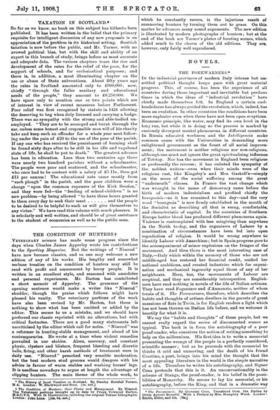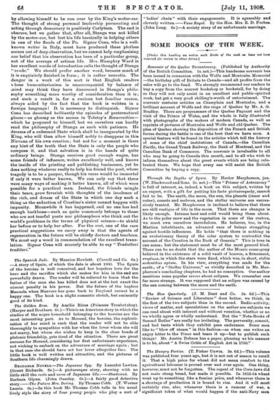NOVELS.
THE FORE WARNERS.
IN the industrial provinces of modern Italy intense but un- settled political thought keeps pace with great material progress. This, of course, has been the experience of all countries during those important and inevitable but perilous times in which the ideas of "industrial revolution" have chiefly made themselves felt. In England a gertain cool- headedness has always guided the revolution, which, indeed, has been an evolution. In other countries the conditions have been more explosive even when there have not been open eruptions. Economic principle, like water, may find its own level in the long run, but while it is doing so the process is marked by curiously divergent mental phenomena in different countries. In Russia educated workmen and the Intelligencia make common cause with the Universities in demanding more enlightened government as the fount of all social improve- ment; the movement is neither religious nor non-religions, although one must not ignore the great spiritualising influence of Tolstoy. Nor has the movement in England been religious or professedly the reverse; it has enlisted the sympathy of the noblest writers—even when their minds were of the religious cast, like Kingsley's and Mrs. Gaskell's—simply on the score of the social suffering among the great "underneath" classes. In France the vast change whioh was wrought in the name of democracy came before the birth of modern industrialism and profited chiefly the bourgeoisie—so it has remained to this day—and the very word "bourgeois" is now firmly established in the mouth of the Socialist as describing all that is smug, comfortable, and characteristic of capital. In the countries of Southern Europe hotter blood has produced different phenomena again. Violence is contemplated with less misgiving than anywhere in the North to-day, and the organisers of Labour by a combination of circumstances have been led into open repudiation of religion. It would be wrong anywhere to identify Labour with Anarchism ; but in Spain progress goes to the accompaniment of minor explosions on the fringes of the movement. And then there is the most interesting ease of Italy,—Italy which within the memory of those who are not middle-aged has restored her financial credit, unified her national ambitions, and created industries which for organi- sation and mechanical ingenuity equal those of any of her neighbours. Here, too, the movements of Labour are sceptical, and they are considerably introspective. English- men have read nothing in novels of the life of Italian artisans. They have read Fogazzaro and d'Annunzio, neither of whom treats of it. The Forewarners, therefore, which describes the habits and thoughts of artisan dwellers in the garrets of great mansions of flats in Turin, is for English readers a light which has not been thrown on Italian life before, and we welcome it heartily for what it is.
We say the "habits and thoughts" of these people, but we cannot really regard the series of disconnected scenes as typical. The book is in form the autobiography of a poor proof-reader, who conceives the notion of writing something to help on the millennium. His first idea is to write a memorial presenting the wrongs of the people in a perfectly considered, scientific manner ; but as he proceeds with the memorial he thinks it arid and unmoving, and the death of his friend Crastino, a poet, brings into his mind the thought that the most appealing literature in the world is the simple narrative of a life. Therefore be writes his autobiography, and Signor Cena pretends that this is it. An unconventionality in the scheme of Stanga, the proof-reader, is his belief in the possi- bilities of Monarchy. He means to lay his memorial, or his autobiography, before the King, and that in a dramatic way • The Forewarners. By Giovanni Cena. Translated from the Italian by Olivia Agresti Rossetti With a Preface by Mm Humphry Ward. London,
Smith, Elder, and Co. ilied
by allowing himself to be run over by the King's motor-car. The thought of strong personal leadership permeating and acting through democracy is positively Carlylean. The end is obscure, but we gather that, after all, Stanga was not killed by the motor-car, but lost his life heroically in helping others in one of the floods of the Po. Signor Cena, who is a well- known writer in Italy, must have produced these plotless scenes out of deep observation, but we cannot help emphasising our belief that his observation has been of a particular group, not of the average of artisan life. Mrs. Humphry Ward in her excellent words of introduction calls the thought of Stanga "crude." We should prefer another word, because much of it is exquisitely finished in form ; it is rather neurotic. The danger in a work of this sort is that English readers -e. hose humanitarianism is unaccompanied by balance of .nind may think they have discovered in Stanga's philo- sophy something more worthy of consideration than it is ; and such a result is, for a curious but familiar reason, always aided by the fact that the book is written in a foreign language ! It is necessary to distinguish. Signor Cena has described brilliantly the episodes of preternatural gloom—as gloomy as the scenes in Toletoy's Resurrection— which he proposed to himself, but we ourselves can hardly read the philosophy of Stanga as such with patience. He dreams of a redeemed State which shall be inaugurated by the King, who will then allow himself nobly to disappear in this Nirvana of his own creation ; but not for a moment is there any hint of the truth that the State is only the people who compose it, and that salvation is in the hands of quite ordinary beings. Stanga receives good enough wages, has some friends of influence, writes excellently well, and knows the inside of the printing and publishing businesses, yet he does nothing whatever really to help his friend the poet, whose tragedy is to be a pauper, though his verse would be immortal if only it were better known. We can only say that there were many ways of making it better known, all of which were possible for a practical man. Instead, the friends mingle their tears, grow feverish with thoughts of the insolence of the rich, and dream of the State in which one day such a thing as the seduction of Crastino's sister cannot happen with impunity. Meanwhile it has happened, and no one has had enough backbone—such as quite commonly belongs to those who are not tearful poets nor philosophers who think out the world's problems in the terms of physical science—to shield her before or to help her after. For the rest, one of the rare practical suggestions we carry away is that the agents of regeneration in the future will be chiefly doctors and teachers. We must say a word in commendation of the excellent trans- lation. Signor Cena will scarcely be able to say " Tracluttori traditori."







































 Previous page
Previous page